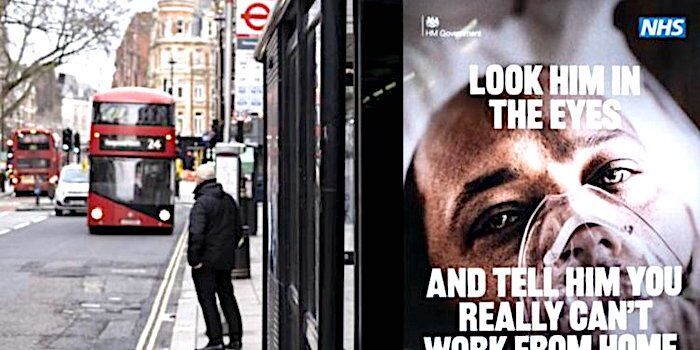But who were the key actors responsible for inflicting the LTITE campaign on the populace?
My recently published research has revealed the identities of those culpable for arguably the most emotionally disturbing assault by state-funded public health technocrats upon the British people. By scrutinising the documented outputs of potentially key actors (politicians, civil servants, advisory groups, advertising executives and prominent behavioural scientists), together with over 40 original Freedom of Information (FOI) requests to Government departments, four players centrally involved in the production of LTITE have been identified.
MullenLowe advertising agency
On January 21st 2021, the Government announced the introduction of the new LTITE Covid communications campaign, describing how it represented a shift in tone from previous pandemic messaging towards "encouraging people to take personal responsibility and consider the impact of their behaviour on others". The same YouGov document also identified MullenLowe as the advertising agency commissioned to create the LTITE videos and posters. The contractual arrangement was a lucrative one, MullenLowe receiving £16 million of taxpayers money in 2020 and a further £40 million for the year August 2021 to August 2022. In keeping with these extraordinarily high payments, Tom Knox (executive partner at MullenLowe and longest serving member of their Covid response team) stated that the pandemic constituted the "biggest U.K. advertising campaign since the Second World War".
The MullenLowe website provides further details of the advertising agency's prominent role in the genesis of the LTITE project. Based on its own commissioned research that had suggested 20% of the population underestimated the risk of COVID-19, it strove to "make the risk real for those who were unsure or didn't believe it" by focusing on the people who had "experienced the very worst of the pandemic". Following the imposition of the second lockdown in January 2021, MullenLowe's overarching goal was to get people to stay at home.
And it is clear that the creators of these harrowing videos and posters are immensely proud of their work. Citing HM Government's astrological computer-modelling predictions as the information source, they claim:
"'Look them in the eyes' was a critical part of the COVID-19 campaign, which is estimated to have prevented between 1.5-1.8 million infections between April-December 2020, saving between 22,629-27,658 lives."Clearly, MullenLowe - in its self-congratulatory myopia - failed to consider the extensive fear-related collateral death toll in their appraisal (for example, consequent to people being too scared to attend hospital with other illnesses, and elderly people being abandoned to die prematurely of loneliness and neglect). Furthermore, given that their campaign was not launched until January 2021, the time span of the HM Government's speculative figures renders the LTITE initiative irrelevant.
Conrad Bird - senior civil servant
Conrad Bird is Director of Campaigns and Marketing at the Cabinet Office, and - by his own admission - was centrally involved in the development of nudge-infused messaging during Covid. In November 2020, prior to the LTITE campaign, Bird celebrates his use of "Embedded evaluators, behavioural insight specialists and decision scientists ensuring constant improvement". Similarly, in the aftermath of LTITE, he says, "We've learned how to deploy behavioural insights from scientists to improve our major campaigns".
When asked in August 2023 (via a personal email) about his role in the development of the videos and posters used in the LTITE project, Bird replied:
"Regarding a specific creative brief, this would have been given orally by my team in response to Government and scientific advice concerning the rise of the Covid Delta [Alpha?] variant. As our advertising agency, MullenLowe will have worked on a number of creative routes in response to the challenge, which would then have been researched in focus groups for their potential effectiveness. The most promising route (Look me in the Eyes) would then have been developed further and signed off by colleagues from Health, the Chief Medical Officer and responsible Ministers."An August 2023 FOI request confirmed that Bird led the commissioning team responsible for the LTITE campaign.
Cabinet Office Behavioural Science Team
Perhaps surprisingly, my research revealed that the direct behavioural science advice to Conrad Bird and his team came neither from SPI-B (the SAGE subgroup dedicated to increasing the effectiveness of the messaging campaign) nor the much-talked-about Behavioural Insight Team (aka the 'Nudge Unit'). Instead, a less visible group of nudgers secreted in the Cabinet Office are implicated as the proximal source of guidance for the civil servants involved in LTITE.
There are up to five behavioural scientists located in the Cabinet Office. (Based on the FOI Act, the authorities are permitted to withhold the exact number when it is no more than five.) And the Government confirmed that this small in-house team "provided insight and guidance to Conrad Bird". Therefore one can conclude that, while the outputs of the SPI-B and the Nudge Unit during Covid often endorsed the use of ethically dubious nudges (see here), and could plausibly have indirectly influenced the various actors involved in the LTITE campaign, the sanctioned source of behavioural science input was the Cabinet Office team.
Matt Hancock - Minister for Health and Social Care
The most predictable finding of all. It will surprise no one that the same Minister who warned youngsters, "Don't kill your gran", and who wished to "frighten the pants off" people with a new variant, was also ultimately responsible for sanctioning the LTITE campaign. As confirmed by a 2023 FOI response, Matt Hancock (the then-Health Secretary) was the individual who conducted the 'sign off' (as referenced in the Conrad Bird statement above).
While this research initiative has identified four key players involved in the development and dissemination of the harrowing LTITE videos and posters, some questions remain unanswered. For instance, the MullenLowe advertising agency will probably employ its own behavioural scientists and it is unclear how much creative autonomy it was granted - the company did not respond to our requests for information about this issue. However, by identifying the main actors responsible for a contentious campaign that strategically scared and shamed an already frightened population, my research provides pointers as to where we might look to expose those culpable for future nudge-infused state propaganda drives, whether they be under the banner of public health, climate or another purported 'global crisis'.




[Link]